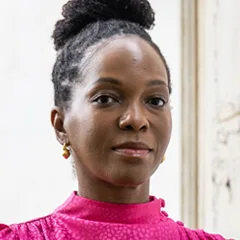
About Imani’s Work
Imani Perry is an interdisciplinary scholar and writer giving fresh context to African American social conditions and experiences along dimensions of race, gender, and politics. Her nuanced and provocative reflections on historical and contemporary life span a wide range of genres and disciplines. Drawing from law, literature, history, philosophy, and popular culture, Perry explores how Black Americans—and often Black women in particular—have resisted, survived, and nonetheless thrived by forging singular paths in the face of oppression and injustice. Her insightful connections between individual experiences, complex social obstacles, and emergent cultural expressions infuse her scholarship with an authenticity and sense of discovery that appeals to broad audiences.
Perry’s 2011 book, More Beautiful and More Terrible: The Embrace and Transcendence of Racial Inequality in the United States, is a multifaceted assessment of racial inequality in contemporary society. Using sources ranging from legal cases to literature, she illustrates how people are socialized into racism in the United States through foundational racial narratives. Perry argues that focusing on whether people and policies have racist intent obscures the persistence of racial inequality in our schools, communities, and employment and housing policies. She presents a similarly insightful consideration of the concept of patriarchy in her book, Vexy Thing: On Gender and Liberation (2018). She traces a through-line of modern patriarchy from the Enlightenment and Industrial Revolution to the present and shows how this system of privilege continues to function in digital media and free-market capitalism. Perry published two other books in 2018 that demonstrate her mastery of a remarkable range of intellectual disciplines. With May We Forever Stand: A History of the Black National Anthem, Perry provides a window into the role music plays in Black Americans’ lives and their struggles for justice. In her hands, “Lift Every Voice and Sing” becomes a vehicle for exploring intergenerational traditions and construction of community. Finally, in Looking for Lorraine: The Radiant and Radical Life of Lorraine Hansberry, Perry presents a moving, multidimensional portrait of the political and literary activism of the young author of “Raisin in the Sun.”
Perry’s recent book, South to America: A Journey Below the Mason-Dixon to Understand the Soul of a Nation (2022) is another example of her deft engagement with many facets of intellectual history and contemporary culture. South to America is simultaneously a history, a travelogue, and a memoir. Perry shares aspects of her own life, including reflections about family living in Alabama, as she thinks through the central role the South plays in American culture. For Perry, “the South” is both a geography and a psychology, a duality that resonates with her own biregional upbringing. Through her expansive and provocative body of work, Perry illuminates rich, dynamic, and often overlooked facets of historical and contemporary culture.
Biography
Imani Perry received a BA (1994) from Yale University, a PhD (2000) from Harvard University, a JD (2000) from Harvard Law School, and an LLM (2002) from Georgetown University Law Center. She was professor of law with Rutgers University School of Law from 2002 to 2009 and was the Hughes-Rogers Professor of African American Studies at Princeton University from 2009 to 2023. Currently, Perry is a Carol K. Pforzheimer Professor, Harvard Radcliffe Institute, and the Henry A. Morss, Jr., and Elisabeth W. Morss Professor of Studies of Women, Gender, and Sexuality and of African and African American Studies and co-founder of the Black Teacher Archive at Harvard University. Her other publications include the audiobook A Dangerously High Threshold for Pain (2023), Breathe: A Letter to My Sons (2019), and Prophets of the Hood: Politics and Poetics in Hip-Hop (2004), and she is a contributing writer at The Atlantic.
In Imani’s Words
“My work is an effort to haunt the past by honoring the nobility of the disregarded….”
My work is an effort to haunt the past by honoring the nobility of the disregarded, to hold fast to the Black Southern intellectual tradition I have been gifted with, and to offer something beautiful and ethical for the ones coming after me.

